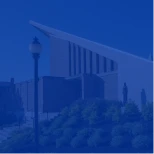Xavier University's online MS in Criminal Justice program equips you with the skills needed to move into leadership roles in law enforcement, corrections, courts, non-profit organizations, security or pursue doctoral programs or law school. This rigorous program blends academic theory with practical application, all in a flexible, online format specifically designed for working professionals.
- Free Online Application
- Get Started on Xavier University’s free online application. You can begin the process in just a few clicks.
- Official Transcript
- One official transcript directly from all colleges or universities that you have attended for any undergraduate and graduate course work. Applicants must have a degree from a regionally accredited university. Send transcripts to:
- Xavier University
ATTN: Admission Processing Center
3800 Victory Parkway
Cincinnati, OH 45207-5131 - For electronic transcripts, send to:
xuadmit@xavier.edu
- Xavier University
- One official transcript directly from all colleges or universities that you have attended for any undergraduate and graduate course work. Applicants must have a degree from a regionally accredited university. Send transcripts to:
- Letters of Recommendation
- 2 letters of recommendation from professional references who are able to assess your potential for success in this program.
- GPA Requirements are:
- 3.0 out of 4.0 in the last two years of undergraduate matriculation; or,
- 2.7 cumulative GPA in undergraduate matriculation; or,
- 2.5 cumulative in the last 2 years of undergraduate matriculation with 5 years of work experience in a criminal justice or related field.
- Official test scores (if needed).
- Applicants not meeting the GPA requirements can submit official test scores
- GRE (Graduate Record Exam): The minimum score requirements is 143 on the verbal section and 3.0 of the analytical section
- MAT (Miller Analogies Test): The minimum scoring requirement for the MAT is 390
- LSAT (Law School Admission Test): The minimum scoring requirement for the LSAT is 138
- Applicants not meeting the GPA requirements can submit official test scores
Students may complete an application form and register for up to 6 graduate credit hours as a “non-degree seeking graduate student” before they are formally admitted in the program.
- Students must turn in all required admissions materials before they are permitted to go beyond the first 6 hours.
- Students do NOT qualify for financial aid until formally admitted into the program.
State Authorization
Xavier University is authorized to offer this fully online degree program in all states.
- CJUS 611: Law & Justice in America..........3 credits
- CJUS 620: Sociology of Crime & Delinquency..........3 credits
- CJUS 623: Perspectives in Law Enforcement Management..........3 credits
- CJUS 633: Forensics & White Collar Crime..........3 credits
- CJUS 642: Criminal Justice Administration..........3 credits
- CJUS 643: Correctional Counseling..........3 credits
- CJUS 644: Government & Non-Profit Accounting..........3 credits
- CJUS 647: Human Resources for Criminal Justice Administrators..........3 credits
- CJUS 683: Research & Planning in CJUS..........3 credits
- CJUS 784: Research Essay..........3 credits
Tuition
- MS..............$739
Fees
- Student ID Fee..............$15
- Graduate Student Association Fee, degree-seeking full-time..............$15 (per semester)
- Graduate Student Association Fee, degree-seeking part-time..............$10 (per semester)
For the full, official listing, please visit xavier.edu/costs.
Xavier University reserves the right to correct any computational or clerical errors.
Why Xavier's Online Criminal Justice Degree?
Learn within a framework emphasizing social justice, ethical leadership and service to others . Our program prepares you not just for a job, but for a calling.
Complete your degree 100% online—study on your schedule, from anywhere. Our asynchronous format means you don't have to put your career on hold.
Learn from experienced scholars and practitioners in small virtual classes (max 25 students) designed for personalized learning.
Graduates are prepared for leadership roles in law enforcement, corrections, courts, non-profit organizations, security and academia.




Hear from our Alumni
"Xavier University's criminal justice program is a place where students and faculty share information and experiences that enhance learning and promote understanding. It’s where our hearts and our minds intersect. The result is a very special bond between people that stands the test of time.”
Joe Milek
Public Safety Research Administrator, John Glenn College of Public Affairs at The Ohio State University
"This program provided me with exceptional knowledge in one of the most important fields of our time. The critical thinking skills I developed continue to play a vital role in my ability to detect, deter and disrupt foreign intelligence services and terrorism activities within the Dept. of Defense."
Graduate of the MS in Criminal Justice Program
Counterintelligence Agent, U.S. Dept. of Defense
In addition to the Master of Science in Criminal Justice degree, Xavier also offers a 9-credit, fully online Certificate in Criminal Justice Administration, with the option to apply credits toward the Master degree later.
The Loyal Musketeer Scholarship reduces the graduate tuition rate by 25 percent and is available to all Xavier alumni enrolling as degree-seeking graduate students.
FAQ
Xavier's Master’s in Criminal Justice program offers a comprehensive pathway to the next step in your career. Learn more.
With an online Master of Science in Criminal Justice from Xavier University, students’ opportunities for work in the field expand immensely. Careers include:
Law Enforcement
- Law Enforcement Officer: A law enforcement officer is a government employee who is responsible for preventing, investigating, apprehending and detaining individuals who are suspected or convicted of breaking the law. Law enforcement officers include uniformed police officers, special jurisdiction police, sheriffs and deputies, state police officers, detectives, and fish and game wardens. Some examples of the many fields of opportunity of work for law enforcement officers include crime scene investigation, human trafficking, emergency management and many teaching positions.
- Prison Warden: The prison warden is the top corrections officer at a correctional facility. As they are in a leadership position, they are primarily responsible for the safe and secure operation of the facility.
- Security Managers: Security managers train new officers, plan and implement security standards, policies and procedures focused on the crime prevention aspect of law enforcement rather than responding. They monitor all large events to ensure public safety.
Criminology
- Criminologist: This area focuses on criminal justice theory, studying crimes, and their cause, effects and social impacts. A criminologist searches and analyzes data to determine the reason the crime was committed and find ways to predict, deter and prevent further crimes.
- Forensic Psychologist: Forensic psychologists apply psychology to criminal matters. They often work in family courts offering psychotherapy services, performing child custody evaluations, and visitation risk assessments. Forensic psychologists that work in criminal courts conduct assessments of juvenile and adult offenders, perform mental competency evaluations and work with child witnesses. They can also work in civil courts providing psychotherapy to crime victims and providing second opinions.
- Forensic Investigator: Fraud investigators help identify fraudulent activities and work to prevent them in the future. Common organizations that employ this role include financial institutions, insurance companies, private investigation firms, and government organizations.
- Policy Analyst: A criminal justice policy analyst gathers, reviews and conducts analysis on data to find trends in the effectiveness of the criminal justice system programs. Duties may include reviewing statistics, determining jail efficiency, reviewing jail management and serving on committees.
Legal
- Attorney General Investigators or District Attorneys: Both of these positions involve criminal justice theory, investigating crimes, undercover work and testimony. District Attorneys may also serve warrants and collaborate with other agencies on cases.
- Victim Advocate: A victim advocate provides information and notification of court proceedings, offers emotional support and victims rights information.
- Correctional Caseworker: This role works with convicted criminals to help rehabilitate and reintroduce them to the community.
Homeland Security
- Cyber Defense Operator: Cyber defense operators collect and process information on a target using geolocation. Other duties include tactical forensic analysis, network navigation and on net operations.
- Intelligence Analyst: An intelligence analyst gathers and analyzes data from a multitude of sources such as law enforcement databases, surveillance, intelligence networks and GIS systems. This career in homeland security focuses on using information gathered to anticipate and prevent organized crime like terrorist attacks.
- Special Agent at the FBI: FBI agents investigate drug trafficking, terrorism, white-collar crime, extortion, and foreign counterintelligence at a national level.
- Special Agent at the DEA: DEA agents are focused specifically on illegal drug trafficking and can be a national or international position.
- Cybersecurity Investigator: Cyber investigation is the process of tracking criminals via the computer. Cybercrimes such as internet fraud, pornography, hacking, copyright infringement, and malicious viral attacks can be performed locally or worldwide. Cybersecurity investigators use a wide variety of techniques and tools to search for and apprehend cybercriminals.
Many professionals entering the criminal justice field already hold an Associate’s or Bachelor’s degree in another discipline. Roles such as corrections officers, court advocates, paralegals and cybercrime specialists often attract graduates with backgrounds in social work, psychology, law or computer science.
Regardless of previous degrees, Xavier University’s Master of Science in Criminal Justice provides the advanced knowledge and leadership skills needed to launch or advance students’ careers in the public or private sector. The program prepares students for management and leadership positions equipping them to make meaningful impacts in the criminal justice system.
No, the criminal justice degree is from Xavier University and is awarded on meeting coursework standards independent of course delivery regardless of being an online program. You will receive a Master of Science in Criminal Justice degree.
If you are new to online learning at Xavier University, we encourage you to go through the student orientation for online courses.
Master of Science in Criminal Justice Program at Xavier University
Xavier University’s online Master of Science in Criminal Justice degree program emphasizes criminal justice administration, training students to provide effective and efficient oversight in matters related to criminal justice and criminal justice research. This flexible online criminal justice master’s program is specifically tailored to students who have set their sights on careers in middle and upper management in the criminal justice system and for students looking to pursue advanced study in a doctoral program or law school. As part of their online master’s degree training, students will study criminal justice work-related topics, and develop leadership and management skills valuable in the justice system, such as public relations, accounting, finance, human resources, policy formulation, budgeting, human interaction, crisis strategies, organizational behavior and writing skills.
Xavier University's College of Professional Sciences prepares undergraduate and graduate students intellectually, morally and spiritually for careers and professions of service. CPS challenges students to strive for academic excellence and life-long learning through promoting collaboration and community partnerships, and incorporating research, scholarship and innovation.
Xavier University is a private university located in Cincinnati, Ohio, providing a liberal arts education in the Jesuit Catholic tradition. Founded in 1831, the University is the sixth-oldest Catholic university in the nation. It has been ranked among the top 10 master's-level universities in the Midwest by U.S. News & World Report for the past two decades. The Princeton Review names it one of the "Best 385 Colleges in America."
